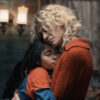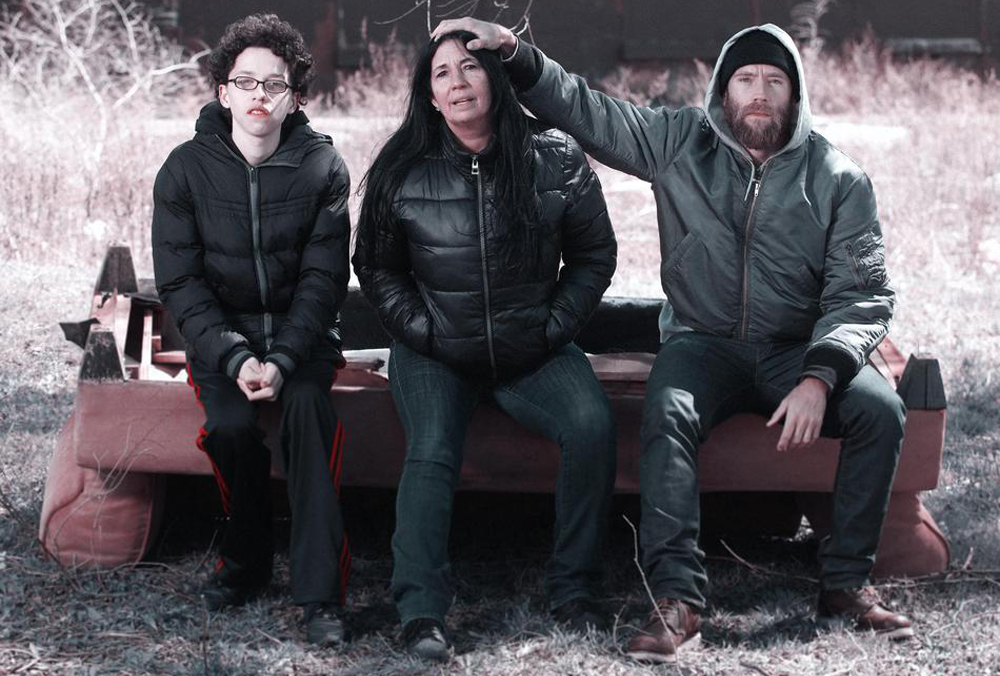“What do you mean, ‘cut’?” Mark Webber can be seen asking his younger brother Guillermo in a scene from “Flesh and Blood,” waking up to being filmed with a camera that he picked up with the aim of giving his insatiably curious kid sibling with Asperger’s something to focus on. Intentional or not, the line has an extra sting coming from Webber, an actor/director for whom the term ‘cut’ has never been a part of his vocabulary when it comes to the separation between his personal life and the films he’s made professionally. With films such as “Explicit Ills,” “The End of Love,” and “The Ever After,” he’s remixed his recent past with actors using their real names interacting with non-actors from his real life, reinterpreting experiences he’s had with dramatic flourishes.
“Flesh and Blood” is no exception, seeing Webber’s return to North Philadelphia where he grew up homeless and raises the stakes by suggesting he’s been in prison for years when in reality, he’s been busy of late with a successful acting career in such films as “Green Room” and “Scott Pilgrim vs. the World.” But regardless of the background, his time away results in a shock to the system upon coming back, arriving just as his mother Cheri Honkala, a longtime community activist, decides to join the Green Party presidential ticket (which actually did last fall), and his brother Guillermo, a sweet fifth grader with a yen for philosophy, is getting bullied at school.
Though Webber would seem to run the risk of having his work called vanity projects, they couldn’t be any further from that description, his decision to turn the camera on himself usually an act of considerable generosity as he opens himself up in order to show situations and environments that don’t often get the big screen treatment. In “Flesh and Blood,” he surveys a community where Honkala has had to get ordained as a minister just so she could help bury all the bodies piling up because of poverty and gang violence, bringing out the daily acts of decency that push back against a feeling of hopelessness in dire circumstances. It’s no coincidence that the journey of Webber’s character in the film leads him to seek out a father he hasn’t seen in years, becoming an especially intimate show of rapprochement that echoes the smaller gestures he documents throughout the film and suggests the common ground there is to be found, even when bridging gaps – personal, economic, and regional – may seem impossible.
By rendering reality and fiction indistinguishable, Webber also brings audiences closer to empathizing with those so far from their own experience and it’s likely many in Austin will be overwhelmed by how moving “Flesh and Blood” is when it premieres at SXSW this week. Nearly a decade after Webber premiered his first directorial effort at the festival, he will lay it all out there once more and before heading to the festival, he took a few moments to talk about the inspiration to make “Flesh and Blood,” how his baby bro unexpectedly outlined one of the film’s major themes with an ad-lib, and how he powers through an editing process for a work that’s so personal.
How did this come about?
A year before we shot this film, I reconnected with my dad, who was not really in my life. I went and I saw him for the first time in 30 years and the whole time I’m sitting there with him, I’m thinking, “Man, I wish I was filming this right now.” So that gave me the idea to make this movie and to ask my mom and my brother if they’d be willing to go on this journey with me. Basically, I love making what I call reality cinema, blending real-life relationships and dynamics into fictional narratives to make things feel so authentic and raw. I feel it’s a little disarming and as an audience member, it makes you engage in a different way than when you see traditional actors acting.
Since you’ve applied this approach to four different films now, have your ideas about that interaction between reality and fiction changed or has your approach to blending them changed in any way?
Yeah, they have. This process really started on my second movie “The End of Love,” and I’ve been refining it since then. With this one, it’s the strongest representation of this technique that I’m exploring, and it’s by just being so super-prepared. The mantra I’ve come up with for this process is preparation to let go [where] I can only actually really be in the moment and let things unfold if we are super-prepared with everything else. This is also the fourth feature I’ve made with the same [cinematographer], the third one with the same editor, the second one with the same producer and camera operator and post-production supervisor, so we all kind of speak the same language. There’s a really deep understanding of this process, which is crucial when you’re playing with staging elements and having people say dialogue, but also letting real moments unfold in real time. It’s really a kind of delicate balancing act and everyone has to be on point and on the same page.
Since I imagine this might be your mom’s world more than yours at this point, is she the one facilitating the community involvement?
You’re totally right about that. Where we are in the film, that’s where my mom really lives, that’s her place with my brother – that’s really his bedroom. That’s my mom’s bedroom, that’s her kitchen and that’s her street. That’s her block. That’s our neighborhood. And my mom is a huge part of that neighborhood. She’s been doing a lot of really beautiful, good work for people in that neighborhood for the bigger bulk of her life, so being able to go back, everyone was more than willing to be a part of this process and support the film – me as an artist, but also for my mom and for all the work my mom continues to do in that neighborhood.
Do you go back regularly or was this your first immersion back there in a while?
I don’t get back to Philly as often as I’d like to, so this was the first significant amount of time that I’ve spent there in years. And sadly, it’s only gotten worse in certain areas in terms of the level of poverty. It breaks my heart. It’s really hard for me being a father to see families struggling to survive, but it’s a pretty incredible thing to be able to go back to my neighborhood and in this community and be embraced with open arms and to really be collaborating with people and making sure that we’re putting a very authentic depiction on screen of this area and of the people.
That’s why your films always seem like such a privilege because I really do feel they take you into an experience that you rarely see on screen, which is obviously important to you, but are these important for you personally as time capsules of your own life?
I’ve called them time capsules myself before in the past and it’s such a cool thing to be able to get to do. My oldest son, Isaac, when he was two, we made “The End of Love” and he still hasn’t been allowed to see the movie yet because of the themes in the film, but he’s the star of it, so it’s this beautiful time capsule of our life together from when he was two years old in this place that we lived together. It’s going to be so much fun in a couple of years when he’s old enough to sit down and watch that movie together, and capturing this moment in time between me and my mother and my brother and my father, who might not be around too much longer, is tremendously beautiful and will be a source of continued inspiration for me.
Not everybody’s mom becomes a Vice Presidential candidate, as your mom Cheryl was for the Green Party, which she announces in the film as if it’s like an errand she’s about to run. Did the real conversation go down like that?
Literally verbatim. [laughs] The nonchalance and the casual way in which my mom just let me know that she was going to be running for vice president of the United States of America was how it happens in the movie. But that’s my mom. She has a really uncanny ability of taking what would be to other people such grandiose, big pieces of news or things and makes them very casual, I think because on a day-to-day basis she is on the front lines of a really intense struggle. The amount of poverty and trauma and pain that she’s seeing on a daily basis [is incredible], so [while] she hasn’t become desensitized, when something big happens, it’s just normal for her, so it was very close to what you see in the movie.
There’s another scene that’s surprising when your younger brother Guillermo brings up Plato’s Allegory of the Cave, which seems pretty deep for someone his age. Was that an idea you had before shooting or something that actually came up on the day?
That is 100 percent Guillermo in the moment and that sums up my brother perfectly. He has these really beautiful non sequiturs that he’ll launch into, just the most elaborate pieces of information and stories. He’s filled with them and literally in the script, I put a placeholder “We’re going to go get pizza, we’re going to talk about me being just out of prison and then I want Guillermo to tell me a story.” I knew whatever he’d pick in that moment was going to be exactly what it needed to be and I still need to talk with him about certain elements in the movie, but his level of awareness of what is going on in the movie and in the story – the fact that he chose that story to tell and just the implications of me and my journey in the movie, it wasn’t until I was edited the movie that I was really like, “What? Guillermo, you’re a genius. How did you do that?” I had so many moments with my brother in this movie. He’s my favorite thing about the film and I think to be able to put a real 13-year-old kid on screen and talk about some of the things he’s going through in life in such an open and vulnerable way is just tremendously brave and amazing of him.
Are these films difficult to edit, being able to remain objective while giving all these various people in your real life their due?
Yeah, it takes a tremendously skilled editor and Sven Pape is that. This is the third film that we’ve done together, so that goes a really long way and part of the process for me, especially when I make something this close to home is that I need a lot of distance on it. So it’s really crucial to be able to turn this over to someone that you trust deeply and whose sensibilities and instincts as a storyteller you admire. I have that with Sven, and each movie that we do together, we get closer and closer and we understand each other and our processes more. With this one, I really allowed Sven to have that time and space as another artist to find the moments that spoke to him and then I come in and I take a look at those moments and add my input. Then we let that breathe a bit and then we start to refine together, and I’m really just incredibly grateful to him in that we have the relationship that we do.
“Flesh and Blood” does not yet have U.S. distribution. It will play at SXSW on March 11th at the Alamo Lamar at 5:45 pm, March 13th at the Alamo Lamar at 10:30 am, and March 15th at the Alamo Ritz at 8:45 pm.




